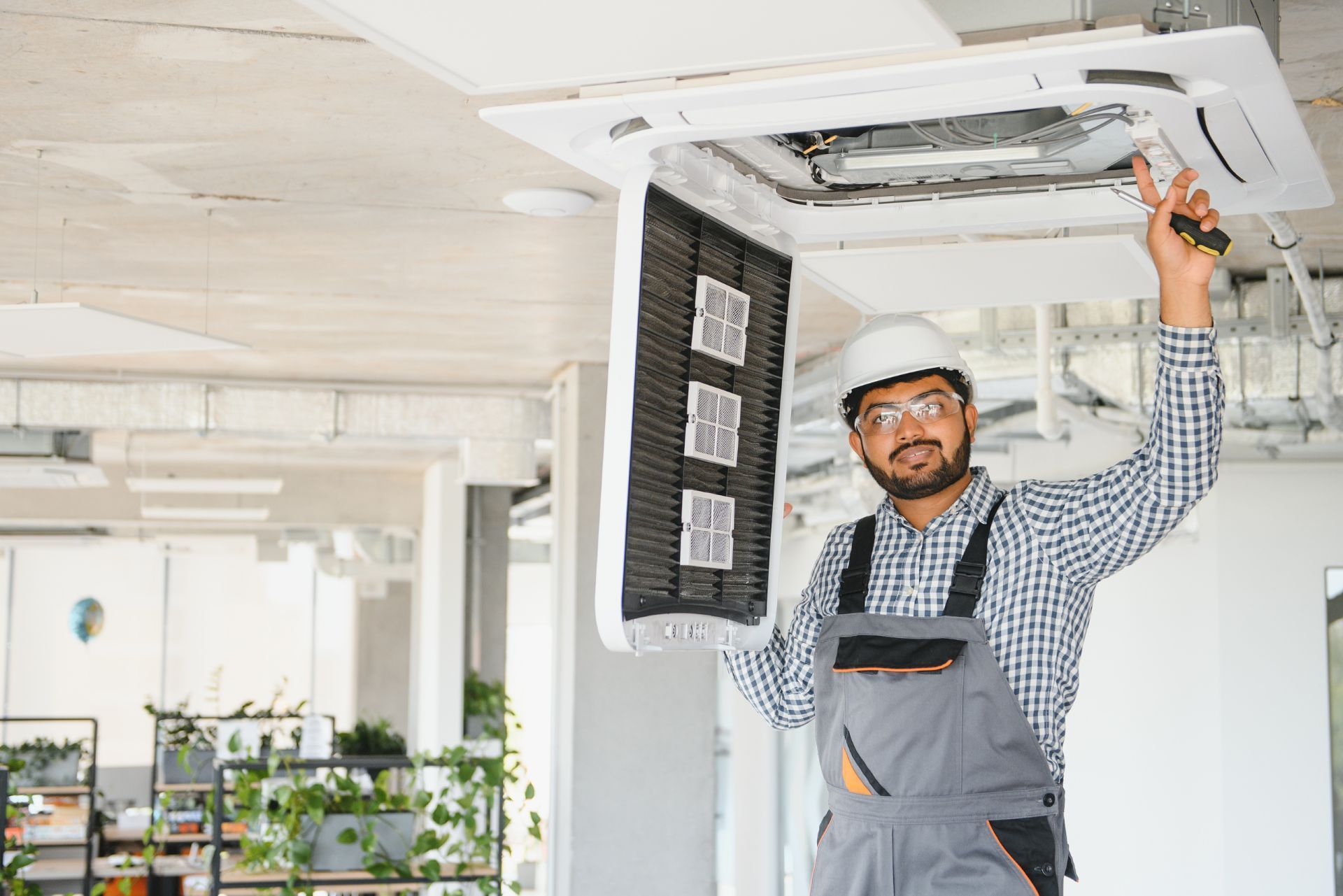Top 3 Recommended Policies

Louisiana’s HVAC contractors face some of the toughest working conditions in the country. High humidity, hurricane seasons, and strict building regulations all create challenges that go far beyond everyday service calls. These factors also make reliable insurance coverage a critical part of running a stable and resilient business. This guide explains how HVAC contractor insurance in Louisiana works, what coverage types matter most, and how climate and regulatory changes are influencing premiums. By understanding your options and staying informed about market shifts, you can protect your business, your team, and your clients no matter what the season brings.
The Current Insurance Landscape in Louisiana
Louisiana’s insurance market is in a state of flux, shaped by both economic and environmental pressures. Property and casualty insurers in the U.S. reported a remarkable 91% increase in profits in 2024 compared to the previous year, totaling $170 billion. While this might seem positive, it also signals tightening underwriting standards and premium adjustments that directly impact contractors and homeowners alike. For HVAC contractors, this means navigating a market where insurance availability and affordability can be unpredictable.
James Donelon, Louisiana’s Department of Insurance Commissioner, has openly acknowledged the severity of the situation, stating, “There's no question we're experiencing a crisis in the insurance availability in our state.” This crisis stems largely from the state’s exposure to natural disasters like hurricanes and flooding, which have intensified over recent years. The frequency and severity of these events have led many insurers to reassess their risk models, often resulting in higher premiums or even non-renewal of policies for certain high-risk areas. This has left many homeowners and contractors scrambling to find coverage, further complicating the already challenging landscape.
Despite these challenges, there are signs of cautious optimism. In 2024, Louisiana’s average approved rate change for homeowners insurance was +6.6%, a significant decrease from +14% in 2023, indicating some stabilization in premium growth. However, contractors should remain vigilant as the market continues to evolve. Additionally, the state has been exploring various legislative measures aimed at enhancing consumer protections and promoting competition among insurers. These initiatives could potentially lead to more favorable conditions for both homeowners and contractors, allowing for a more sustainable insurance environment in the long run. Furthermore, as technology continues to advance, insurers are beginning to leverage data analytics to better assess risk, which may lead to more tailored insurance products that could benefit contractors in the HVAC sector.

Why HVAC Contractor Insurance is Essential in Louisiana
HVAC contractors face a range of risks that make insurance not just a regulatory formality but a critical business safeguard. From property damage and equipment loss to liability claims and workers’ compensation, having comprehensive coverage protects against financial devastation. The unpredictable nature of Louisiana's weather, with its sweltering summers and occasional hurricanes, adds another layer of risk. HVAC contractors must be prepared for emergency repairs and service calls that can arise from extreme weather conditions, making reliable insurance coverage even more vital.
Louisiana ranks as the third most expensive state for workers’ compensation insurance, with rates around $6,080 per $100,000 of payroll. This high cost reflects the state’s risk profile and underscores the importance of carefully selecting policies that balance coverage and affordability. HVAC contractors employing workers must prioritize workers’ compensation insurance to comply with state laws and protect their teams from workplace injuries. Additionally, the unique challenges of working in Louisiana, such as high humidity and the potential for mold growth, can lead to specific health risks for workers, making comprehensive insurance even more critical for safeguarding their well-being.
Moreover, HVAC work involves interaction with residential and commercial properties, which exposes contractors to liability risks. General liability insurance covers claims related to property damage or bodily injury caused by the contractor’s operations. Without it, a single accident could lead to costly lawsuits and damage to a business’s reputation. In a state where community ties are strong, maintaining a good reputation is essential for long-term success. An incident that results in a claim could not only drain financial resources but also jeopardize future contracts and client relationships.
Types of Insurance Every Louisiana HVAC Contractor Should Consider
Understanding the core insurance types relevant to HVAC contractors is crucial for building a robust risk management strategy:
- General Liability Insurance: Protects against third-party claims for bodily injury or property damage.
- Workers’ Compensation Insurance: Covers medical expenses and lost wages for employees injured on the job.
- Commercial Auto Insurance: Essential if vehicles are used for transporting equipment or traveling between job sites.
- Equipment and Tools Coverage: Protects expensive HVAC tools and machinery from theft or damage.
- Professional Liability Insurance: Also known as errors and omissions insurance, it covers claims of negligence or faulty workmanship.
In addition to these core types of insurance, HVAC contractors in Louisiana should also consider investing in
cyber liability insurance. As technology becomes increasingly integrated into HVAC systems, the risk of cyber threats grows. This coverage can protect against data breaches and other cyber incidents that could compromise client information or disrupt business operations. Furthermore,
business interruption insurance can be a lifesaver if a natural disaster, such as a hurricane, forces a contractor to halt operations temporarily. This type of coverage ensures that contractors can maintain their financial stability even when faced with unexpected challenges.
Cost Factors and Rate Trends for HVAC Insurance in Louisiana
Insurance premiums for HVAC contractors in Louisiana are influenced by several factors, including the company’s size, claims history, location, and the specific coverage limits chosen. Given the state’s high workers’ compensation rates and the ongoing insurance availability crisis, contractors should expect premiums to reflect these risks. Additionally, the geographic location within Louisiana plays a crucial role; areas prone to severe weather events such as hurricanes or flooding may see higher premiums due to the increased risk of property damage and subsequent claims. Contractors operating in these high-risk zones must be particularly vigilant in managing their insurance portfolios to ensure they are adequately covered without incurring exorbitant costs.
Property insurers in Louisiana have also adjusted their claims handling practices. In 2024, insurers closed 51.1% of homeowners’ claims without payment, up from 45% in 2023. This trend indicates a stricter claims environment that could indirectly affect contractors working on insurance-related repairs or installations, as claim denials may delay payments or reduce work opportunities. Furthermore, these changes in claims processing can lead to increased scrutiny on the quality of work performed by HVAC contractors, as insurers may require more documentation and proof of compliance with industry standards before approving claims. This heightened vigilance can place additional pressure on contractors to maintain meticulous records and ensure that all installations meet the latest safety and efficiency regulations.
Despite these challenges, the recent moderation in homeowners insurance rate increases—from +14% in 2023 to +6.6% in 2024—suggests that the market is slowly responding to regulatory and economic pressures. HVAC contractors should monitor these trends closely and work with insurance agents familiar with Louisiana’s unique market conditions to secure the best possible rates. Additionally, as the state continues to grapple with climate-related challenges, there may be opportunities for HVAC contractors to diversify their services, such as offering energy-efficient systems or disaster preparedness solutions. By adapting to the evolving landscape, contractors can not only mitigate their insurance costs but also position themselves as leaders in a market that increasingly values resilience and sustainability in home systems.
Protecting Your Business from Contractor Fraud
Contractor fraud is a growing concern in Louisiana, especially as hurricane seasons approach and demand for repairs surges. Fraudulent contractors can cause significant financial harm to homeowners and legitimate businesses alike. David J. Glawe, President and CEO of the National Insurance Crime Bureau, warns that “Contractor fraud costs hardworking Americans billions of dollars every year.”
HVAC contractors should take proactive steps to protect their businesses from being implicated in fraudulent schemes or becoming victims themselves. This includes maintaining transparent business practices, verifying client information, documenting all work thoroughly, and ensuring all insurance policies are current and comprehensive.
Additionally, educating clients about common fraud tactics and encouraging them to verify credentials can help build trust and reduce the risk of scams in the community. For instance, contractors can provide clients with a checklist of questions to ask potential service providers, such as inquiring about licensing, insurance, and references. This not only empowers clients but also reinforces the contractor's commitment to ethical practices.
Moreover, staying informed about the latest trends in contractor fraud can further enhance a business's defenses. Regular training sessions for employees on recognizing and reporting suspicious activities can create a culture of vigilance within the company. By fostering an environment where everyone is alert to potential fraud, contractors can significantly mitigate risks. Networking with local trade associations and participating in community outreach programs can also help contractors stay connected and informed about emerging threats, ensuring they are always one step ahead of fraudulent schemes.

How to Choose the Right Insurance Provider in Louisiana
Selecting an insurance provider that understands Louisiana’s complex market and the specific needs of HVAC contractors is critical. Look for insurers with a strong track record in the state, competitive pricing, and responsive claims service.
Given the state’s fluctuating market conditions, it’s advisable to work with an insurance agent or broker who can tailor policies to your business size, scope, and risk profile. They can also assist in navigating regulatory changes and ensuring compliance with Louisiana’s insurance requirements.
When evaluating providers, consider their financial stability, customer reviews, and willingness to offer risk management advice. The right partnership can make a significant difference in managing costs and minimizing business interruptions.
Additionally, it’s important to assess the range of coverage options available. Many insurance providers offer specialized policies that cater specifically to the HVAC industry, including liability coverage, equipment breakdown insurance, and workers' compensation. Understanding these options can help you protect your business from unforeseen events, such as equipment failure or employee injuries, which are not uncommon in the HVAC field.
Moreover, the local climate and environmental factors in Louisiana can also influence your insurance needs. With the state’s susceptibility to hurricanes and severe weather, having coverage that includes natural disaster protection can be invaluable. This not only safeguards your physical assets but also ensures that your business can recover quickly from unexpected disruptions, allowing you to maintain your reputation and client trust in a competitive market.
Conclusion: Staying Ahead in Louisiana’s Insurance Market
Louisiana HVAC contractors face a challenging insurance environment shaped by natural disasters, high workers’ compensation costs, and a tightening claims landscape. However, with careful planning and informed decision-making, contractors can secure the coverage they need to protect their businesses and thrive.
Staying informed about market trends, such as the recent moderation in homeowners insurance rate increases and the rising rate of claims closed without payment, empowers contractors to negotiate better terms and prepare for potential risks. Additionally, vigilance against contractor fraud and partnering with knowledgeable insurance providers are key strategies for long-term success.
For more detailed insights into Louisiana’s insurance market and how it affects contractors, visit
Real Reform Louisiana, where ongoing research sheds light on the evolving landscape.
Contact Us
HVACInsure is fully licensed and permitted to sell contractor and commercial insurance in Louisiana.
We proudly serve clients throughout Louisiana and maintain partnerships with local Louisiana insurance carriers to ensure HVAC professionals receive compliant, affordable, and comprehensive coverage that meets project and regulatory requirements.
HVACInsure Focuses on Louisiana HVAC Contractor Insurance
New Orleans – Baton Rouge – Shreveport – Metairie – Lafayette – Lake Charles – Bossier City – Kenner – Monroe – Alexandria – Prairieville – Houma – Marrero – New Iberia – Laplace – Central – Slidell – Terrytown – Ruston – Sulphur – Harvey – Hammond – Bayou Cane – Natchitoches – Gretna
Frequently Asked Question
Common HVAC Contractor Insurance Questions in Louisiana
These FAQs address common contractor questions. As HVACInsure grows, we will update this section with real client experiences and answers.
How does Louisiana's hurricane exposure affect my HVAC insurance?
Louisiana faces serious hurricane risk. We cover emergency repairs, storm damage work, and the surge in demand that follows major storms.
What coverage do I need for Louisiana's extreme humidity?
Louisiana's humidity creates significant HVAC challenges. We cover mold liability, moisture damage, and the IAQ issues that arise from humidity problems.
Do I need special coverage for petrochemical plant work?
Louisiana's chemical corridor has strict contractor requirements. We understand plant insurance demands and can meet their certificate needs.
What about coverage for New Orleans's historic properties?
The French Quarter and Garden District have unique challenges. We cover the liability of working in historic buildings with strict preservation requirements.
How do Louisiana's licensing requirements affect my insurance?
Louisiana requires HVAC contractors to be licensed. We ensure your coverage meets State Licensing Board requirements.
Can I get coverage for coastal Louisiana work?
Absolutely. Coastal communities face unique risks. We structure coverage that addresses salt air, flood exposure, and remote location challenges.

Still have questions?
Can’t find the answer you’re looking for? Please chat to our friendly team!

About The Author: James Jenkins
I’m James Jenkins, Founder and CEO of HVACInsure. I work with HVAC contractors and related trades to simplify insurance and make coverage easier to understand. Every day, I help business owners secure reliable protection, issue certificates quickly, and stay compliant so their teams can keep working safely and confidently.
Recognized by National HVAC Trade Associations
These trusted organizations set best practices and standards that carriers rely on when underwriting HVAC risks.
Membership signifies adherence to HVAC industry standards and contractor best practices.


